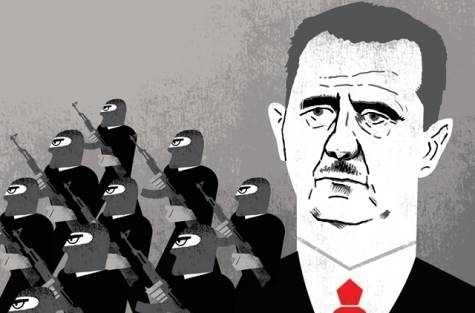As international and regional attention shifts from war-torn Syria to beleaguered Iraq, the regime of President Bashar Al Assad is making quick gains on a number of fronts. It has found an unlikely ally in the extremist Islamic State of Iraq and the Levant (Isil), which had taken much of western Iraq along with Sunni insurgents from local tribes. Al Assad is no longer the number one regional villain; that depiction now belongs to Isil that has declared a ‘caliphate’ over regions under its control extending from Mosul, Iraq’s second largest city, to Deir Al Zor in eastern Syria, an area covering thousands of square kilometres.
The sudden emergence of Isil as one of the main militant groups fighting in Syria in the past few years has altered the course of the Syrian uprising. Rather than fighting the regime, Isil, which comprises mostly foreign fighters, following strict Salafist jihadist doctrines, has been fighting other rebel groups over “liberated” territories, mainly in northern and eastern Syria. Since its split from Al Qaida earlier this year, Isil, under self-proclaimed caliph Abu Bakr Al Baghdadi, has spread terror in areas under its control by implementing strict Sharia, including beheadings and crucifixions of opponents and so-called apostates. It has declared war on Shiites and Alawites and others as it pursues its main objective, which is to create an Islamic state in the Levant and Iraq.
The Free Syrian Army (FSA) and other rebel groups have accused Isil of colluding with the Al Assad regime. They insist that areas under the control of Isil have been spared regime aerial bombings. In recent months, Isil militants have evicted FSA forces, which are allied with Jabhat Al Nusra, an Al Qaida affiliate, and others, from strategic areas in eastern Syria, thus allowing them to connect with comrades in western Iraq, especially in the Anbar governorate. To Al Assad’s benefit, the FSA and others were compelled to shift attention to Isil fighters, who are better equipped and more organised, thus easing pressure on regime forces. This was a major turning point in the course of Syria’s civil war. It allowed the government to regroup and hit rebel forces in strategic areas. With limited supplies and weapons, the rebels were forced out of Homs in May and are now on the brink of losing Aleppo, Syria’s largest city.
Washington has been slow to recognise the growing threat of Isil. No one had predicted its stunning takeover of at least three governorates in northern Iraq last month. And even when the US administration and the West admitted that Isil posed a grave regional and international threat, it balked at supplying the FSA with quality weapons to fight the new menace. This only improved Al Assad’s chances of crushing the rebels and driving them out of key towns and cities. The Syrian National Coalition (SNC), which has been largely discredited because of internal divisions and foreign infiltration, has warned that the fall of Aleppo will alter the course of the rebellion in Syria. Their call for outside help is yet to be heard. The rise of Isil and the crisis in Iraq, which threatens to divide the country, have sidelined once staunch supporters of the rebels such as Turkey and the Gulf states.
Lack of foreign backing
Having seized large caches of weapons, tanks and armoured vehicles from Iraqi bases and troops, Isil militants have driven back the FSA from Deir Al Zor, Al Hasakeh and Bou Kamal in eastern Syria and there are reports that they are now moving south to Daraa and the southern districts of Damascus. Frustrated by lack foreign backing, many FSA and Jabhat Al Nusra fighters have pledged allegiance to Al Baghdadi and walked over to the other side.
The Al Assad regime is now focusing its efforts on quashing Syrian rebels and driving them out of key cities and towns. Once Aleppo falls, it will turn its attention to Daraa in the south and wage a final assault on FSA positions in southern Damascus. With world attention focusing on Iraq and in the absence of a political solution, the Syrian uprising faces an existential challenge. The western option of arming the FSA so that it can stand up to Isil may become irrelevant once Aleppo falls.
Meanwhile, events in Iraq will have a drastic effect on the future of Syria. The Sunni insurgency there may soon collide with Isil, thus igniting a long and brutal civil war among transient allies. And once Al Assad’s forces take back key regions from the FSA and others, it will eventually face Isil fighters. Already Syrian jets have struck areas in Iraq under the control of Isil. No one really knows how that eventual confrontation will end. Ironically, Al Assad, Iraqi Prime Minister Nouri Al Maliki, Iran, the US and even Russia may work together to stem the rise of Isil in both Syria and Iraq.
Al Assad’s reversal of fortune in his quest to crush the uprising may be short-lived. He may win his war against the rebels, but the outcome of his showdown against Isil is far from guaranteed.
......


